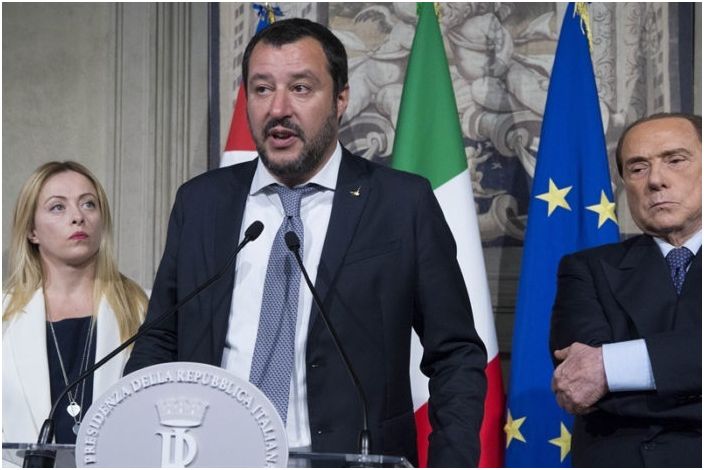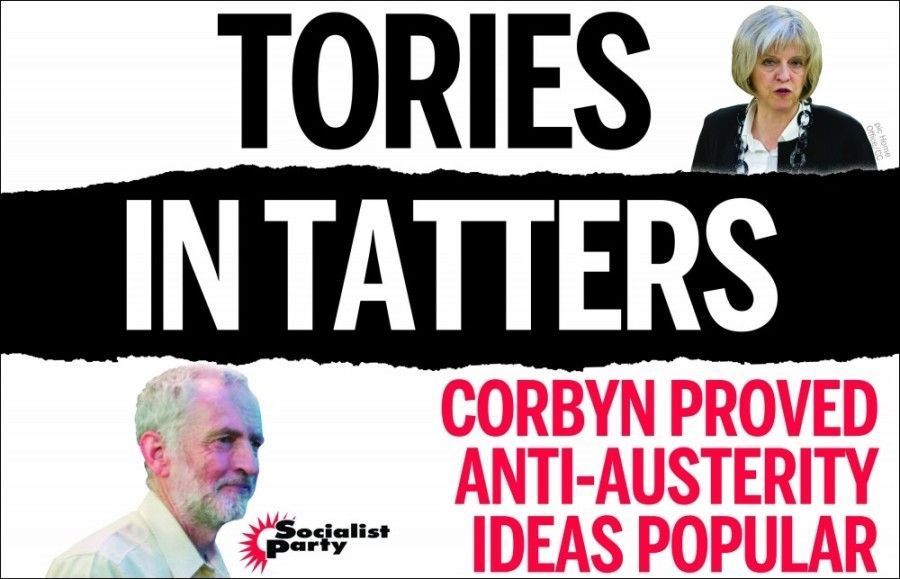Giuliano Brunetti is a member of Resistenze Internazionali (CWI in Italy).

Less than two years after the last election, Italy faced a a crisis as the Lega/Five star movement (M5S) coalition government was brought down by Matteo Salvini, leader of the far-right Lega and Minister of the Interior. However, a new coalition was put together of the M5S and the centre-left Democratic party (PD), with Conte continuing as Prime Minister.
Salvini had sought to capitalize on the growing support for his party in opinion polls. His policies, including his attacks on “illegal immigrants” and the Roma people, his Euro-scepticism and opposition to same-sex marriage backed up by his media appearances and legal initiatives have reduced the room for maneuver for the M5S, which initially supported the Lega in government as the minority partner. The results of May’s European elections confirm the reversal in the balance of forces between the two parties – since the March 2018 election Lega’s vote increased from 17 to 34%, M5S’s fell from 32 to 17%.
Salvini has provoked the government’s collapse, accusing it of not taking responsibility for passing a new budget including drastic cuts in public expenditure, the blocking of public contracts and a freeze on hiring in the public sector combined with privatization and a huge increase in VAT that, by 2020, will cost 23 billion euros.
At the same time, Salvini is pushing for an early election so that his followers do not have time to realise that he is actually a politician fully integrated into the neoliberal framework and unable to manage the coming confrontation with the European Union while implementing the very austerity policies he claims to oppose.
But things are not so easy for Salvini. Within Lega, there is a sharp conflict between a more populist wing of young careerists who are interested in an early election so they can benefit from the increase in Lega’s support and a grouping of so-called responsible administrators with experience of government and authoritative party spokesmen who are terrified by the prospect of instability. They are represented by Undersecretary of state Giancarlo Giorgetti and by the President of the northern Veneto region Luca Zaia. Salvini is forced to mediate between these apparently irreconcilable positions, this explains his apparently contradictory position on the question of supporting the government. Salvini wants to bring down the government but fears that this maneuver could turn against him.
Unable to provide answers on economic issues, Salvini has stirred up hatred and spread fear related to the so-called ‘immigrant invasion’. He fuels xenophobia and racism by consciously whipping up hysteria by suggesting that diseases once eradicated are returning due to immigration.
The economic background against which the new election is being prepared is devastating. According to the European Commission, the country’s GDP will grow by just 0.1% in 2019. This is the worst result in the eurozone. As if that was not enough, Italy is the only country in the European Union in which investment is expected to fall, by 0.3%, in 2019. Unemployment rates are amongst the highest in Europe with a further decline by 0.1% expected in 2019. Furthermore, Italy has committed itself, in line with the European Commission’s demand, to cut public expenditure by several billion euros in the eventuality, now a certainty, that the country will be unable to reduce public debt by 2020.
Trying to divert the attention of ordinary people from the economic crisis, Salvini and the parliamentary majority that supported the Conte government has introduced, in recent months, a series of repressive measures that represent a harsh attack on the collective freedoms of workers and young people.
In particular, the ‘security decree’ and ‘security decree bis’ introduce very severe penalties against anyone who is opposing, even passively, law enforcement. It is now enough to participate in a roadblock, or in a demonstration with a mask or even to argue with a police officer to be punished with imprisonment for up to three years. Similarly, the ‘security decree bis’ criminalizes the rescue of refugees and migrants crossing the Mediterranean and the work of those NGO’s accused of human trafficking. Those who save these people are liable to fines of up to 1 million euros.
These racist measures have not yet generated mass protest in our country. They are welcomed by a layer of reactionary people, although it should be stressed that they are still a minority, even if that minority is inflated, noisy and over-represented.
But the reality is, that these inhumane laws do not prevent fishers or the rank and file and officers of the Italian coastguard from performing the sacred duty of every sailor to rescue those who are drowning.
Since its appearance in 2009, the ‘Five star movement’ has presented itself as ‘anti-establishment’. But in reality, M5S has played a key role in maintaining the stability of the political system and in dispelling the anger and social frustration of millions of workers. Projected into government due to the bankruptcy of the traditional parties, the M5S has succeeded in the almost impossible task of legitimizing them once again. As part of the coalition with Lega, it has voted in favor of extending the Trans Adriatic Pipeline, betraying the wishes of many of its electors, in favor of the renewal of concessions to the private motorway companies and approved the two security decrees.
As a result of this, the party is now more and more discredited and the ruling class no longer has any reliable instrument for containing the anger and frustration generated by a decade of crisis. The M5S today has proved itself incapable any longer of fulfilling the function for which it was conceived.
In this context it seems improbable, although not impossible, for an agreement between the M5S and the former left Democratic Party (PD) to allow the formation of a new government without an election. An agreement of this type would represent a real political suicide, first and foremost for the M5S, which will lose its “anti-system” label force becoming known, instead, as the rescue belt for the establishment parties, ready to do anything to maintain its own offices and to guarantee the stability of the system.
A coalition agreement between the M5S and the PD would be the best gift imaginable for Lega and its partners. It could present itself as an opposition force and go to the next election with a clean slate. Under pressure from Brussels and of that section of the elite that wants stability headed by President Sergio Mattarella, a section of the ruling class could be tempted to play this card to guarantee a minimum level of stability allowing for the new budget to be passed by parliament.
But this short-sighted political maneuver would only postpone an electoral triumph for the Lega in alliance with even more far-right parties such as the ‘Brothers of Italy’. Nevertheless, facing the prospect of a new economic crisis with Italy at the centre of the storm, particularly given the desperate state of the Italian credit system, it may be that the fear of instability could mean the Italian and European bourgeoisie could be tempted by such suicidal scenario.
The other option that cannot be excluded, even if today it seems remote, is that the entire political class could turn to a ‘technocrat’ figure to do the dirty work instead as it has done in the past with the Dini, Ciampi and Monti governments. Suitors for this infamous task are not lacking – Draghi are Cottarelli are just two possibilities.
But one thing is clear, the parliament that will emerge when the next elections do take place will be dominated by the reactionary bloc of Lega and the extreme right-wing party Brothers of Italy. We can expect a further decline in support for M5S and a further growth in abstention. A technocrat government would only postpone such a scenario.
The formation of a Lega government will mark the end of an historical cycle. The political and social consequences are difficult to predict. It took 20 years for Berlusconi and his party to destroy their electoral base. During this time despite scandals of all kinds, he remained the main protagonist of Italian political life. Following his failure, the Democratic Party was able to take temporary advantage. In just five 5 years, they slumped for first to third political force in the country loosing hundreds of thousands of members and destroying an organizational heritage built up over 60 years and inherited from the Communist party. As a consequence of the failure of these forces, the M5S emerged, presenting itself as the party of ‘honest’ and ‘ordinary’ citizens opposed to the corrupt political caste. It took them about ten years to reach government, it took just one year to destroy what they had built in those ten years.
Now Lega is preparing to reach its highest point to form a government on its own. But they will do so in a new ungovernable political scenario dominated by economic stagnation and the constant threat of a new great recession. If there is one feature that stands out, it is the absolute volatility of the electoral system and the dramatic acceleration of the rhythm of events. Phenomena, trends and developments that, in the past, took shape in decades now reach maturity in a few months. This is the most indisputable characteristic of the present situation.
The complete break-up of the current political system is on the agenda. Within the Democratic Party, former Premier Matteo Renzi is becoming more frenzied as he prepares to launch his “civic action committees” as a national party. The M5S is crossed by deep fissures that are growing due to its disastrous record in government. It cannot be excluded that a sector of M5S led by the President of the Chamber of Deputies, Roberto Fico, could ask and obtain the resignations of prime minister Conte and M5S leader Di Maio. Or Conte could be candidate to lead a new government with the Democratic Party. That would accelerate the process of disintegration of the M5S.
At the same time, Berlusconi’s Forza Italia has just suffered from the exit of Giovani Toti, the former spokesman for Berlusconi and President of the Liguria region. This will lead to major changes in the center-right. As if the situation was not already grotesque enough, some media figures such as the arrogant and wealthy entrepreneur Flavio Briatore and even Emanuele Filiberto di Savoia, nephew of the former king Umberto II, threaten to enter the political arena with their own new party, declaring that Italy needs their service!
The probable triumph of a reactionary block in the coming election and the formation of an extreme right-wing government headed by Salvini and Meloni will be a cause of great concern for Italian and European workers. Such a government will continue to attack the living conditions of the working class, will continue to propose barbaric inhuman policies and to criminalize migrants. Inevitably a government so far to the right will fuel a right-wind dynamic across the country. Incidents of intolerance will increase and neo-fascist organization will continue to grow.
At the same time, it is equally inevitable that such a nightmare scenario will produce a reaction from sections of the youth and working class. This process is already developing. Not a single day passes without spontaneous protests erupting wherever Salvini goes.
Faced with the growth of the extreme right, in the context of the almost total collapse of the traditional political parties of the bourgeoisie, including the so-called anti-establishment parties, a class-conscious section will begin to consciously orient itself toward an anti-capitalist alternative.
Although the anti-capitalist alternative is today weak, the logic of events is such that fresh forces who are flexing their muscles in this difficult period, whether the young activists of the anti-racist movements and those opposed to Salvini or new combative trade union militants will begin to draw anti-capitalist conclusions. It will be necessary to intervene energetically in this process with an ambitious program to assist these new activists to learn from the mistakes of the past and draw revolutionary, socialist conclusions by building a new, working class force that can stand up to the dictates of the European Commission and Italian big business, overthrow capitalism and establish a democratic, socialist Italy.



